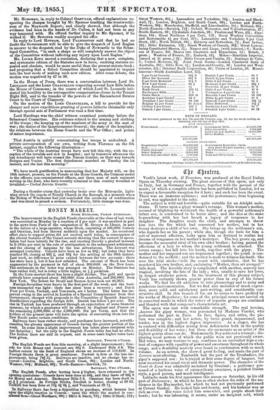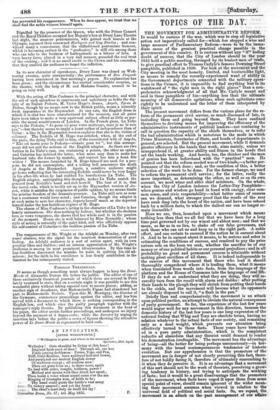'Arnim
Verdi's latest work, II l'rovatore, was produced at the Royal Italian Opera on Thursday evening. The great success of this opera, not only in Italy, but in Germany and France, together with the perusal of the music, of which a complete edition has been published in London, led us to expect a favourable reception for it here ; and such has been the event. There was an immense audience; and the performance, from beginning to end, was applauded to the echo.
The subject is wild and horrible—quite suitable for an Adelphi melo- drama. It turns upon a gipsy woman's revenge. This woman's mother, accused of blighting by witchcraft the health of a powerful nobleman's infant son, is condemned to be burnt alive ; and she dies at the stake bequeathing with her last breath a legacy of vengeance to her daughter. The daughter steals the child, and attempts to throw him into the fire which had consumed her mother, but in her frenzy destroys a child of her own. She brings up the nobleman's son, who regards her as his parent ; while she, though she feels for him a sort of maternal affection, looks upon him as destined to realize her dreams of vengeance on her mother's destroyer. The boy grows up, and- becomes the successful rival of his own elder brother ; having gained the affections of a lady to whom the young nobleman is attached. The lovers escape; but fall into his hands, together with the gipsy. The mother and her supposed son are imprisoned together ; the youth is con- demned to the scaffold ; and the mother is made to witness his death. She sees the fatal stroke=--tells the count with exultation, that ho has murdered his own brother, and, exclaiming "Mother, thou art avenged!" falls dead. The horrible story is complicated with another, scarcely less tragical, involving the fate of the lady ; who, unable to save her lover, in despair swallows poison. In the treatment of this gloomy subject, Verdi has certainly shown greater power than in any of his former works. We find his old addiction to trite phraseology and to noisy and ponderous instrumentation. But we find also melodies of much expres- sion, more solid and satisfactory part-writing, and considerable con- structive skill. In this branch of his art he seems to have profited by the works of Meyerbeer ; for some of the principal scenes are carried on in concerted music in which the voices of separate groups are combined and blended with that composer's characteristic art.
The opera was cast with remarkable strength. The real heroine, Azucena the gipsy woman, was personated by Madame Viardot, who performed the part in Paris. In face, figure, and attire, the pic- ture was complete ; and her action, by turns grand, impassioned, and tender, was in the highest degree impressive. As a singer, she has
to contend with difficulties arising degree- deficiencies both in the quality and flexibility of her voice ; but these she surmounts as an artist of the highest genius alone can do. Mademoiselle Ney achieved a triumph ; dis- playing vocal powers of which the public were not previously aware. Her voice, we may venture to say, combines in an unrivalled degree ex- tent of compass with equality of power and sweetness throughout its whole range, and a flexibility scarcely ever found in combination with so much volume. As an actress, she showed great feeling, and made the part of Leonora most affecting. Tamberlik had the part of the Troubadour, the gipsy's supposed son : he betrayed at first some degree of languor, but soon recovered his usual vocal and dramatic, power. The character of the Count de Luna was admirably sustained by Graziani ; a performer pos- sessed of a baritone voice of extraordinary sweetness, a polished Italian style, a good person, and much intelligence. Lablache made his first appearance this season on Saturday, in his old part of Duleamara ; in which he has so often shaken the sides of the au- diences in the Haymarket, but which he had not previously performed at Covent Garden. He looked hale and hearty, and his humour was as rich as ever. His voice failed him somewhat, and people shook their heads; but he was labouring, it seems, under an incipient cold, which
has prevented his reappearance. When he does appear, we trust that we shall find the noble veteran himself again.



























 Previous page
Previous page